Ethiopia, official named Federal Democratic Republic of Ethiopia, is a
federal republic with nine semi-autonomous administrative regions and
two special city administrations. Located in the Horn of Africa,
Ethiopia is bordered in the north and northeast by Eritrea, on the east
by Djibouti and Somalia, on the south by Kenya and on the west and
southwest by Sudan. A landlocked country, Ethiopia has relied on the
port of Djibouti since the 1998-2000 border war with Eritrea. The
capital is Addis Ababa, headquarters of the Organization of African
Union (OAU). 
Ethiopia is credited with being the origin of mankind. Considered the oldest independent country in Africa and one of the oldest in the world, the modern Ethiopian state was created by highland rulers in the later half of the 19th century. Ethiopia also enjoys the status of never to have been colonized, and the country’s independence was only interrupted by a short period of time by the Italian control from 1936 until 1941.
The population is 83 million and is highly diverse. The Oromo, Amhara, and Tigreans represent more than tree-fourths of the Ethiopia’s population, however there are more than seventy seven different ethnic groups with their own distinct languages. Amharic is the official language.
Government
The executive branch includes09 a president, Council of State, and Council of Ministers. The executive power is developed by the Prime Minister. There is a bicameral parliament responsible for the legislative power, and the judicial branch comprises federal and regional courts. The suffrage is universal starting at age 18.
Next Parliament elections: 2010.
Primary government officials
President: H.E.M. Girma WOLDE-GIORGIS
Prime Minister: H.E.M. Meles ZENAWI
Deputy Prime Minister: H.E.M. Addisu LEGESSE
Mayor of Addis Ababa: H.E.M. Kuma DEMESKA
ETHIOPIAN ECONOMY: GENERAL OVERVIEW
The Ethiopian Economy has grown stronger by the transition from a command to a market-based economy. The previous system of price control has almost been discarded, the tax and rates have decreased, and several sector restrictions have been removed. The current government has embarked on a cautious program of reform, including privatisation of state enterprises and rationalization of government regulations. So far the reforms have attracted only scarce foreign investment, and the government remains deeply involved in the economy.
A One-stop shop service has been created and allows to set up a company in one day.
Here are the main economic sectors in the country, each of it being fully abundant of opportunities for foreign investors.
Agriculture
Etiopia’s economy is based on agriculture, which has contributed 43% in 2007, according to official sources. About 80% of the population gain their livelihood directly or indirectly from agriculture, including livestock. Coffee is the main cash crop, but its share of total export earnings slipped from 50-60% in the 1990s to about 35-40% subsequently because of lower world coffee prices and growing sales of other commodities such as oilseeds, khat (a mild stimulant), leather and gold. Flower sales are also growing quickly.
Industry
Industrial growth has been robust in recent years, driven by agro-processing. This sector keeps on growing every year by 9% to 12%, depending on the years.
Textile and Leather
Leather is one of the major manufactured goods in Ethiopia. The amount of livestock is indeed impressive and allows a very high-quality production. Export earnings rose by 11% year on year to US$75 Millions.
Construction
The construction sector is one of the booming ones. A new building is getting out of the ground every 10 meters in the capital. New offices, new hotels, new houses…the demand is huge. A massive opportunity for local or foreigners, who create construction and real estate companies every day.
Mining
The mining represents only 0.5% of GDP, it is mainly centred on the extraction and sale of gold.
Energy
Ethiopia relies heavily on hydroelectricity. Ethiopia is poor in energy resources, with the exception of hydroelectricity. Approximately 98% of power is generated from hydroelectric sources, and there is enormous untapped potential along the rivers draining from the central highlands.
Services
Banks: Most of Ethiopia's private banks recorded significant profit rises in the 2006/07 financial year (ending July 7th), reflecting the booming economy. But since last October 2008, partially due to the international crisis, Ethiopia is facing a huge problem regarding the lack of foreign currencies, which complicates drastically the trades. Indeed, the Ethiopian National Bank must approve all international imports.
Let’s also precise that foreign banks are not allowed to set up in the country…
Telecommunications: There is only one operator in the country: Ethiopia Telecommunications Corporate, a state-owned company. Due to the absence of competition, the coverage is poor, representing a serious impediment to economic activity and foreign investment, although networks are expanding quite rapidly. However, services are concentrated in Addis Ababa as a result of the high teledensity.
Transport: Ethiopia is connected with the port of Djibouti by road and rail for international trade. Of the 23,812 kilometres of all-weather roads in Ethiopia, 15% are asphalt. Mountainous terrain and the lack of good roads and sufficient vehicles make land transportation difficult and expensive. However, the government-owned airline’s reputation is excellent. Ethiopian Airlines serves 38 domestic airfields and has 42 international destinations.
Imports / exports
Ethiopia’s major export commodities include leather products, coffee, cocoa beans and products, cut flowers, fruit, gold, khat, oil products, tea. The major import commodities include chemical products, consumer goods, food ingredients, edible oils and petroleum products. The main trading partners are Djibouti, Germany, Japan, Saudi Arabia, United States, UAE and Italy.
Dependent on a few vulnerable crops for its foreign exchange earnings and reliant on imported oil, Ethiopia lacks sufficient foreign exchange earnings. The financially conservative government has taken measures to solve this problem, including stringent import controls and sharply reduced subsidies on retail gasoline prices. Nevertheless, the largely subsistence economy is incapable of meeting the budget requirements for drought relief, an ambitious development plan, and indispensable imports such as oil. The gap has largely been covered through foreign assistance inflows.
Ethiopia & USA relationships
Apart of being a strategic partner of the United States in the Global War on Terrorism, Ethiopia also benefits of the U.S. assistance programs which help Ethiopia to create economic growth and promote an enabling environment for agriculture, the private sector, small and medium-sized enterprises, and trade and investment. These programs include investments in the tourism sector, agri-business expansion, and continued support to African Growth and Opportunity Act exports, World Trade Organization accession, pastoralist areas, and the livestock and agriculture sectors. U.S. program's Agribusiness and Trade Expansion Activity increases exports by supporting entire value chains for goods.
| Key Economic Indicators GDP (2008, official exchange rate): $25 billion. Annual growth rate (2008): 8.5%. GDP per capita (2008, PPP): $800. Average inflation rate (2008): 41%. Natural resources: Potash, salt, gold, copper, platinum, natural gas (unexploited). Agriculture (46% of GDP): Products--coffee, cereals, pulses, oilseeds, khat, meat, hides and skins. (Cultivated land--17%). Industry (13% of GDP): Types--textiles, processed foods, construction, cement, and hydroelectric power. Services (41% of GDP). Trade (2008): Exports--$1.4 billion. Imports--$6.2 billion. |
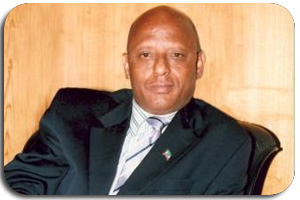 Mr. Ali SuleimanCommissionerFederal Ethics & Anti corruption Commission Mr. Ali SuleimanCommissionerFederal Ethics & Anti corruption Commission | 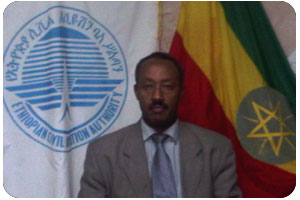 Mr. Gobena GuangulDeputy Director GeneralEthiopian Civil Aviation Authority Mr. Gobena GuangulDeputy Director GeneralEthiopian Civil Aviation Authority | 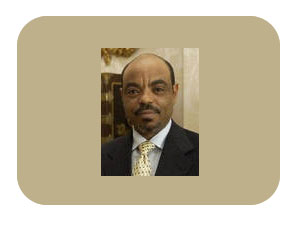 Meles ZenawiPrime MinisterN/A Meles ZenawiPrime MinisterN/A |  Johnathan GrayGeneral ManagerHARMONY HOTEL Johnathan GrayGeneral ManagerHARMONY HOTEL |
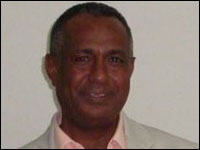 Mesfin TeshomeGeneral ManagerALMETA IMPEX PLC Mesfin TeshomeGeneral ManagerALMETA IMPEX PLC | 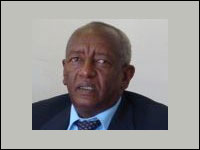 Mr Lulseged TEFERIPresidentDASHEN BANK Mr Lulseged TEFERIPresidentDASHEN BANK | 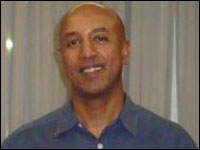 Ermyas AmelgaChairmanZEMEN BANK Ermyas AmelgaChairmanZEMEN BANK | 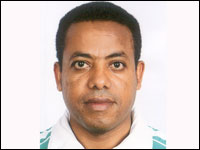 Solomon GetuGeneral DirectorLeather & Leather Products Technology Institute (LLPTI) Solomon GetuGeneral DirectorLeather & Leather Products Technology Institute (LLPTI) |
 Mr Jean-Pierre MANIGOFFGeneral ManagerSHERATON ADDIS Mr Jean-Pierre MANIGOFFGeneral ManagerSHERATON ADDIS |  Chanyalew YILMAPresidentBank of Abyssinia Chanyalew YILMAPresidentBank of Abyssinia |  Dr Ahmed AbdurahmanGMGolden Bridge Consulting Dr Ahmed AbdurahmanGMGolden Bridge Consulting | 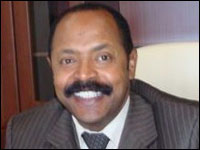 Tesfaye BeyeneManaging DirectorOK Jamaica Shoe Factory Tesfaye BeyeneManaging DirectorOK Jamaica Shoe Factory |
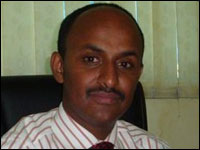 Mr Kumneger TEKETELGeneral ManagerAmbassador Hotel Mr Kumneger TEKETELGeneral ManagerAmbassador Hotel |  Sheila Atieno YiekeGeneral Manager, Legal and Corporate AffairsKenya Investment Authority Sheila Atieno YiekeGeneral Manager, Legal and Corporate AffairsKenya Investment Authority |
 Addis Ababa City Roads AuthorityGovernment Addis Ababa City Roads AuthorityGovernment |  Ethiopian Electric Power CorporationGovernment Ethiopian Electric Power CorporationGovernment |  Harmony HotelTourism Harmony HotelTourism |  Jupiter international hotelTourism Jupiter international hotelTourism |
 Atlas International Hotel P.L.CTourism Atlas International Hotel P.L.CTourism |  Water Works Design and Supervision Enterprise (WWDSE)Water Resources Water Works Design and Supervision Enterprise (WWDSE)Water Resources |  Water Works Construction EnterpriseWater Resources Water Works Construction EnterpriseWater Resources |  NIB INTERNATIONAL BANK S.CFinance NIB INTERNATIONAL BANK S.CFinance |
 Construction and Business Bank S.CFinance Construction and Business Bank S.CFinance |  Salvatore De Vita & Family Pvt.Ltd.Co.Trade & Industry Salvatore De Vita & Family Pvt.Ltd.Co.Trade & Industry |  ITSC Technology SupportTechnology ITSC Technology SupportTechnology |